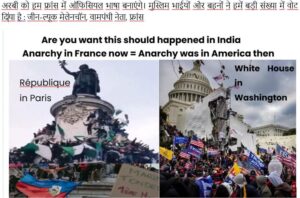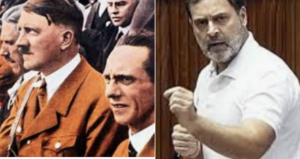
Dr. Walter Anderson, an American scholar who currently heads the School of Advanced International Studies at Johns Hopkins University and has written several acclaimed works on the RSS, has written an interesting essay in a collection on ‘Integral Humanism’ (published by Deendayal Research Institute) . He compares Gandhi with Pandit Deendayal Upadhyay, a senior RSS pracharak and ideologue.
Upadhyay was one of the founders of the Bharatiya Jana Sangh, the then incarnation of the Bharatiya Janata Party. “Interracial Humanism” is the official ideology of the ruling BJP.
In an essay titled Gandhi and Deendayal: Two Seers, published in 1992, Anderson drew comparisons between Gandhi and Upadhyaya and found many things in common.
After Mohandas Gandhi emerged as the leading figure in India’s independence movement in the 1920s, his life, ideas and programs became the benchmark against which other Indian political and social figures were compared. There has been a notable resurgence of interest in Gandhi since the Bhartiy Janata Party’s electoral victory, with many of its leaders tracing the party’s ideological roots.
Along with this interest has developed in the life of Deendayal Upadhyay. Until recently, he was not widely known outside the borders of the Jana Sangh.
It was almost inevitable that the two men would be compared, for both intellectual and ideological reasons. However, there are major difficulties in any attempt to do so. The political climate in which he operated was different; His own social background was not the same; Their most immediate political objectives were not the same. Perhaps the most difficult problem is the paucity of available material on Upadhyaya. Unlike Gandhi, who was the most public of private men, Upadhyay was a quiet man, preferring to work out of the spotlight. The published collection on his life and thought is still very slim. Research is now underway in India to rectify the situation and the time may be near when we will get a more complete picture of his contribution to the social and political thought of India. Consequently, any attempt to compare Upadhyaya and Gandhi must be very preliminary and subject to much revision as more information comes to light. Those best qualified to speak on them are those who worked closely with Upadhyay and will hopefully contribute to the efforts of those who are gathering material on them.
Neither Gandhi nor Upadhyay were really intellectuals in the traditional sense of the word – learned and refined men with academic credentials and a long list of books. Neither wrote systematic treatises on ethics and politics, nor was any a philosopher, in the sense that they were not particularly interested in abstract theoretical formulations. For example, Gandhi told a scholar researching the concept of *Satyagraha*: “But Satyagraha is not a subject of research – you must experience it, use it, live by it” (John Bandurant, Violence Victory of – page 146). A similar story can be repeated for Upadhyaya as well.
Both men were charismatic figures, although Gandhi had a greater influence, as many considered him a saint, if not a saint. His austerity convinced many that he was capable of realizing ideals that many believed in, but which few could realize. (See studies in Lloyd and Susan Rudolph, Modernity of Tradition, Part 2).
“Gandhi transformed the Indian National Congress… His charismatic appeal as ‘Mahatma’ transformed the Congress into the effective action of the arm of independence movement… Upadhyaya also possessed the character of the saintly… He had a similar effect on the cadre of Jana Sangh. “
Deendayal Upadhyay dedicated his life for the work of Rashtriya Swayamsevak Sangh committed for national awakening youth and national unity. Served as a Pracharak (full time worker) till 1942-51. Till 1951, he continued to work for social consciousness by holding various positions in the Sangh.When the Jana Sangh was established in 1951, he offered his services to the Jana Sangh. Dr. Syama Prasad Mukherjee was so much impressed by his organizing ability that after the Kanpur session, he said that if I had 2 Deendayals, I would have changed the political face of India.
Unfortunately Dr. Mukherjee died in 1953. After the death of Mukherjee, the responsibility of changing the political nature of India fell on the shoulders of Pandit Deendayal. He accomplished this task so quietly and discreetly that when the results of the 1967 general elections began to emerge, the country was taken by surprise. In terms of vote percentage, Jana Sangh has reached the second number among political parties. There were some minor defections during the period, with the Jana Sangh being the only major Indian party that did not suffer any significant rift. This is a testimony to the united organization that they contemplated.
Although Deendayal ji became a great leader, he lived in a very simple way. He used to clean his own clothes himself. Didn’t make noise about foreigners but they never buy foreign goods.
Gandhi’s political objective was Swaraj (self-rule). But he interpreted Swaraj as more than just independence from the British; It brought the meaning of a comprehensive self-reliance to the village level. Self-reliance turned into a concrete program of action which inspired him to advocate Swadeshi (self-reliance).
Gandhi was a strong supporter of ‘Swaraj’ and ‘Swadeshi’. Upadhyay emphasized on the same philosophies while talking about ‘Integral Humanism’. In fact, the rejection of Western models of development was the basis of the thought process of both Gandhi and Upadhyaya.
Upadhyaya’s writings display a comparable indignation against the effects of the Western model of development. In a series of lectures on Integral Humanism in Poona in 1964, which was later adopted as the official ideological statement of the Jana Sangh, he attacked both socialism and capitalism. “Democracy and capitalism join hands to give free reign to exploitation. Socialism replaced capitalism and brought with it the end of democracy and individual liberty” (Integral Humanism – p. 10). In their place, he proposes a model that takes into account all aspects of the human condition, “body, mind, intellect and spirit – these four make up a person”. (Integral Humanism – page 24)
Upadhyay was not adverse to the selective adoption of science, technology or even urbanisation. (Integral Humanism – page 8)
The centrality of the nation in his view rests on the notion that it has a soul (i.e., “Chiti”), which is shaped by experiences within a given geographical space and inspired by a supranational ideal (Ekatma). Humanism – pages 36-37) “A system based on the recognition of this mutually complementary nature of the various ideals of mankind, their essential harmony, a system that formulates laws that remove dissonance and their mutual usefulness and cooperation increases, only there can be peace and happiness for mankind; can ensure sustainable development” (Integral Humanism – page 39)
Tags: : American scholar Dr. Walter Anderson, Integral Humanism, Deendayal Upadhyay RSS pracharak, Deendayal Upadhyay JanSangh founder, BJP ideology, Thoughts Programs of Mahatma Gandhi, Susan Rudolph, Gandhi transformed Congress, Rashtriya Swayamsevak Sangh, Dr. Shyama Prasad Mookerjee, 2 Deendayals, Swaraj Swadesh
By – Premendra Agrawal @premendraind




